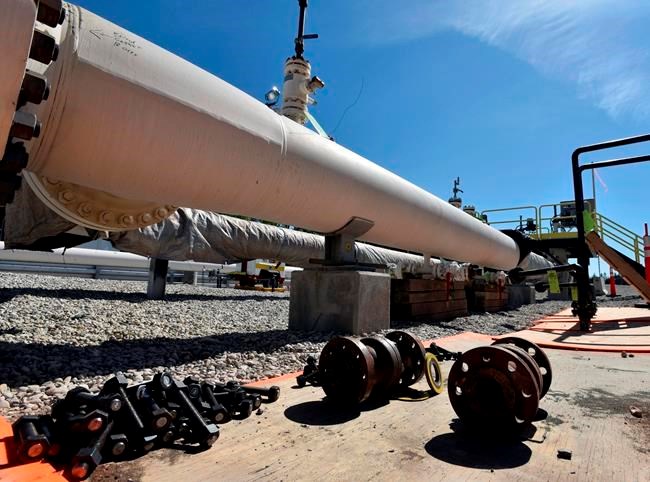WASHINGTON — Michigan's efforts to shut down Enbridge Inc.'s Line 5 cross-border pipeline have "directly and significantly" impacted the relationship between Canada and the United States, the company argues in new court documents.
Lawyers for Enbridge Inc. have asked for leave to file a supplemental brief that suggests the company is leaning heavily on the argument that the dispute over Line 5 is now an international incident and a matter for federal court.
The brief, a copy of which was entered Thursday as an exhibit in U.S. District Court in Michigan, points to a number of lower-court precedents in which a plaintiff's claims had a direct bearing on U.S. foreign relations.
"That describes this case perfectly," the brief says.
"The state of Michigan's lawsuit led directly to objections by the government of Canada and discussions between U.S. and Canadian officials at the highest levels."
Line 5 ferries upwards of 540,000 barrels per day of crude oil and natural gas liquids across the Canada-U.S. border and the Great Lakes by way of a twin line that runs along the lake bed beneath the ecologically sensitive Straits of Mackinac, which connect Lake Michigan and Lake Huron.
Proponents call it a vital and indispensable source of energy — particularly propane — for several Midwestern states, including Michigan, Ohio and Pennsylvania, and a key source of feedstock for critical refineries on the northern side of the border, including those that supply jet fuel to some of Canada's busiest airports.
Its critics, however, including Michigan Gov. Gretchen Whitmer, want the line shut down, arguing it's only a matter of time before an anchor strike or technical failure triggers a catastrophic environmental disaster in one of the area's most important watersheds.
They also point to the recent pipeline rupture off the coast of California, believed to be the result of an anchor strike, as an example of the fate that could befall the straits if Line 5's operations continue.
Last November, Whitmer abruptly revoked the easement that had allowed the pipeline to operate since 1953, giving the company until May to voluntarily cease operations and triggering a court case that has only dragged on since then.
The latest batch of documents includes a statement earlier this month by Foreign Affairs Minister Marc Garneau that says Canada has flagged the significance of Line 5 "for Canadian economic and energy security at the highest levels of the U.S. federal government."
"We have also stressed the importance of fully respecting and implementing the international agreements that are in place between our two countries."
That's a reference to the 1977 transit pipelines treaty, a 44-year-old bilateral commitment to the uninterrupted flow of oil and gas liquids between the two countries, which Canada formally invoked three weeks ago.
"It is … beyond dispute that Michigan's claims have directly and significantly affected U.S. foreign relations with Canada," the brief reads.
"Any ruling by a court on this issue could undermine, conflict or interfere with the obligations and processes established by the treaty, as Canada has suggested in proposing that this matter be held in abeyance."
Both the federal government and the White House have repeatedly waved off questions about the dispute, citing the ongoing court proceedings.
The latest documents come after District Court Judge Janet Neff rejected a batch of letters to the court, including one from lawyer Gordon Giffin, a former U.S. ambassador to Canada who is representing the federal government.
The various letters laid out the bulk of the arguments being made in the latest briefs, but were in violation of court rules that prohibit the submission of briefs "in the form of a letter to the judge," Neff ruled.
Enbridge, which has warned that shutting down the pipeline would have dire consequences for energy consumers in both countries, has steadfastly maintained it has no plans to do so voluntarily.
A court-sanctioned mediation process, which began in April, has failed to yield any agreement and appears to have fallen apart, although the official status of those talks remains unclear.
Court documents show Michigan has no "desire to continue with the mediation process," while Enbridge wants the talks to continue.
This report by The Canadian Press was first published Oct. 22, 2021.
James McCarten, The Canadian Press




